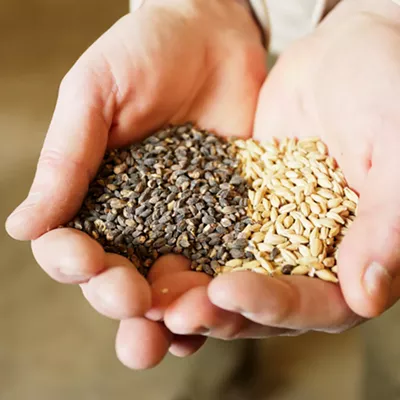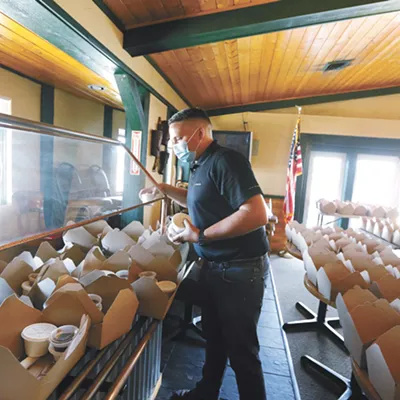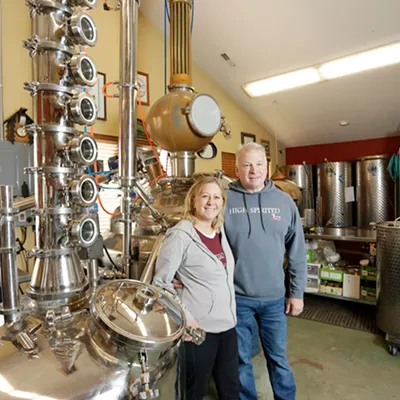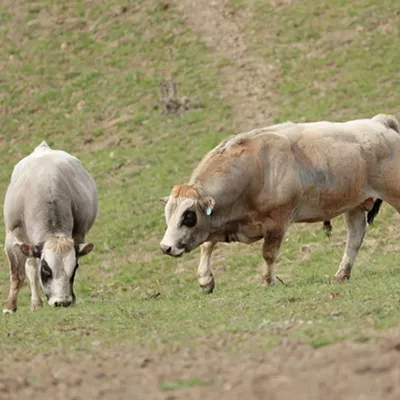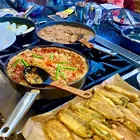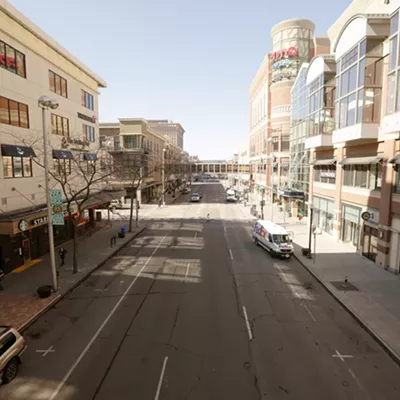Between a white picket fence, a pickleball court and a pizzeria, a green vine crawls along the dirt. On the edge of modern urbanization, a near-forgotten agricultural heirloom of Spokane Valley reemerges.
The River District Farm is a 3-acre community garden on the edge of the River District, a Greenstone development in Liberty Lake. This year, amongst pumpkins, Italian plums, garlic, strawberries and herbs, it's also growing Heart of Gold cantaloupes, a unique variety of melon that was popular all over the Valley until it disappeared about three decades ago.
The neighborhood farm is dedicated to informal, experiential food education from seed to harvest to table, so it's fitting that this would be a place to resurrect one of the area's most historic fruits.
"It was an heirloom cantaloupe variety grown in the Valley all the way back to the 1920s," says Jim Frank, the now-retired founder of the local property development company Greenstone, as he tests the softball sized melons for ripeness. He was the biggest impetus behind setting apart land in the housing development for the garden. Frank still volunteers regularly, helping to dry herbs, weed beds or run the farm store.
The cantaloupe will stay small, but you'll know they're ripe when they snap easily off the vine, he says. As he lifts the fruit, Frank explains that after the apple orchards started failing in the Valley during the 1920s, many growers turned to other produce instead. In her compilation The Spokane Valley: A History of the Growing Years, local historian Florence Boutwell wrote that Heart of Gold cantaloupes, asparagus and tomatoes became the predominant crops around 1925.
The Heart of Gold cantaloupe became an informal ambassador for the region — residents even held a harvest celebration for it. Today's Valleyfest, the city's fall festival, still hosts a Heart of Gold parade, originally named for the personal-sized bright orange melon.
"My kids love them," says Kellie Hansen, who lives in the River District and volunteered this year to lead the pumpkin patch and U-pick flower garden. "They taste like honey-flavored cantaloupe."

It's unclear why the heirloom variety fell out of style. They'll last up to a month maximum after being picked, Frank says, so they're probably more suited to local farm stands than grocery store shelves. Scientific improvements have produced bigger cantaloupes that are easier to industrialize, which have gone on to replace their miniature forebears.
But part of Frank's intention for the urban garden is to teach kids and adults alike where their food comes from — not only the soil, but also the ancestral varieties that are quickly disappearing from supermarkets.
"There are things you can't get in a grocery store," Frank says. "We're trying to preserve some heirloom varieties."
A small, young orchard behind the garden beds has a few Santa Rosa plum trees, which Frank hasn't been able to find anywhere else. The farm is also growing Tropea onions — red, oblong onions from Italy's Calabria region renowned for their sweetness.
While the Santa Rosa plums are gone, the Tropea onions are cured and the Heart of Gold melons started ripening last week. They'll be harvested for most of September — gardeners did two plantings of the cantaloupes so harvest would last longer.
Curious shoppers can stop by the River District Farm Store, which is right next to the garden, on Saturday mornings from 10 am to 1 pm to buy the melons, or potatoes, onions, herbs and flowers, too. The store also has local honey from the farm's four beehives, plus apples, eggs and sourdough bread from other local growers and producers.
The farm is completely volunteer-led and isn't out to make a profit, Frank says. The group just hopes to earn enough money to buy seeds and compost for next year's projects. Anything that's not sold is donated to the Edible Tree Project, which distributes the fresh produce to local food banks.
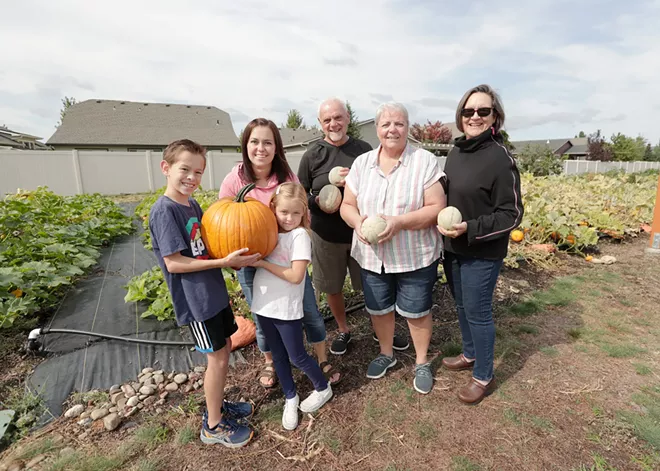
The River District Farm has always been more personal than financial for Frank. He learned the joy of gardening from his grandmother, an Italian immigrant who moved to the United States as a teenager.
"For my grandmother, growing, preserving, cooking and serving food was her entire life," he says. "Plus, my father was a gardener. I learned the joy of it and the value it brings — not only in helping you eat better, but it was a gathering thing for our family."
But when it comes to building a development, a garden ticks a lot of boxes for the neighborhood, too.
"I wouldn't be doing it if I didn't think it didn't add a lot of value to the community," he says. "It creates a social fabric that people are really looking for."
When choosing amenities for a planned community, most developers immediately think of parks, Frank says. But too often, parks end up underutilized. To Frank, a garden provides a similar kind of green space and gathering place for the neighborhood, but it also allows for educational opportunities, a source of local food, plus land conservation and even enhancement.
"The farm has attracted an enormous number of bees and birds," Frank says.
In the flower garden, sparrows flutter under the sunflowers and pick up fallen seeds. Flowers were Hansen's idea, who moved to Liberty Lake four years ago. She didn't want to give up having neighbors, but she still wanted her three kids to have plenty of access to nature, both edible and not.
"I feel like there's huge value in flowers," she says. "They cheer people up. They've brought so many bees. They give people a beautiful, peaceful place to walk through."
There's a paved path that winds its way past the gardens and connects the neighborhood to the Centennial Trail. This summer, while Hansen and her kids have been out planting or picking flowers, they've met so many people they might not have spoken to otherwise.
"We see people that we've seen on our street and they've seen us, but we've never really talked," she says. "But they'll say something like, 'Oh, we love your flowers,' and I'll say hi and ask them their name. Then someone else will walk by who knows them, and they stop and then pretty soon there's like this group of, like, 10 people just there chit-chatting and talking about the farm."
This fall, the farm will offer a seed saving class and a U-pick pumpkin day for kids. River District community members can also talk with Frank and other participants about what they'd like the garden to include. Cosmos and zinnias, Jack-o-lanterns, or forgotten cantaloupes — it's completely up to preference.
"Some people like to play pickleball or golf," Frank says. "But I like gardening."♦









